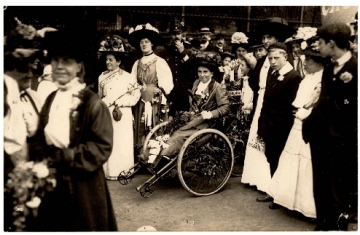Rosa May Billinghurst
The full resource is FREE to all registered users of the website
If you are not already registered you can sign up for FREE website access to download the full resource.

- Born: 1875
- Died: 1953
- Occupation: social campaigner
- Claims to fame: used her wheelchair to distribute leaflets and parade the WSPU colours
Her background
May (as she preferred to be called) was from Lewisham in London and joined the WSPU in 1907. She had polio as a child, leaving her partially paralysed and using a wheelchair. She became known as the ‘cripple suffragette’, not just by other suffrage campaigners but also by the national newspapers. Her work in a workhouse led her to believe that if women had the vote, they would use it to end poverty. May took part in suffrage processions in her wheelchair (known as a tricycle), distributing leaflets as she went. Her tricycle was brightly decorated with flowers and in WSPU colours. May founded the Greenwich branch of the WSPU, acting as its secretary.
As a suffragette
In November 1910, May took part in a suffrage demonstration that became known as 'Black Friday' because of the violent treatment of women by police. May was thrown out of her tricycle. In 1911, she was arrested in Parliament Square for obstructing the police and sentenced to five days in prison. She was sentenced to one month’s hard labour in 1912 for taking part in a window-smashing campaign, and received another eight-month sentence for her role in the December 1912 attacks on pillar boxes in Deptford. The people that force-fed her ripped her nostril and broke a tooth. Her treatment was reported in the newspapers and, after appeals, she was released. In May 1914, as part of a larger WSPU demonstration, she chained herself in her tricycle to railings at Buckingham Palace. She retired from suffrage activities after the 1918 Representation of the People Act.
Did you know?
Other women with disabilities campaigned for women’s suffrage: Adelaide Knight, who used crutches her entire life, and Mary Somerville, the first woman asked to sign the 1868 suffrage petition. She was a mathematician and astronomer, who was also hearing-impaired.
Questions
- What problems would someone with a disability have faced at the start of the 20th century?
- Why was force- feeding so brutal?
- Was May typical of the WSPU members?
Useful resources
- Elizabeth Crawford, The Women’s Suffrage Movement: a reference guide, 1866–1928 (Routledge, 1999)
